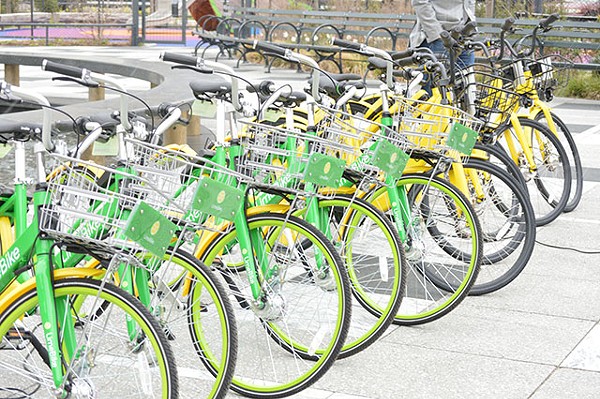During their initial month of service, Ofo and LimeBike each introduced 750 bikes to the streets, adding approximately 350 more every month. As part of bike share regulation, a cap was set at 2500 bikes. This may sound like very many bikes, but since the bikes are dockless and do not use the traditional stations in Washington D.C. or Chicago, a lot of bikes are required to ensure that bike users are always less than a five minute walk to a bike.
The bike sharing program was created to serve all the residents of St. Louis, visitors, and workers. The companies are obliged to accept cash payment and non-smartphone payment options and are also expected to maintain twenty percent of the bikes available in certain neighborhoods that could greatly gain from the affordable transportation alternative. These neighborhoods are in the Dutchtown South area, and to the north between Natural Bridge and Delmar.
Presently many cities across the United States are introducing this kind of license to introduce dockless bike share to their regions at zero cost and without using taxpayers’ money, while still regulating bike sharing companies to help achieve the cities’ objectives and to maintain order. The gains communities derive from bike sharing include healthier lifestyles, access to local businesses, connections to transit, and an increase in scooter and bike ridership.
The increase in accessibility and convenience is one of the main reasons why bike sharing is rapidly spreading across the United States. Currently, LimeBike operates on many campuses and in more than 30 cities. Ofo has more than ten million bikes in twenty countries and two hundred and fifty countries, including fifteen cities in the United States.
These programs have been instrumental in increasing ridership than their traditional station-based counterparts in the same region. Although the St. Louis Dockless Bike Sharing Program was introduced recently, it has quickly become an integral part of the region’s transportation.
When the St. Louis Dockless Bike Sharing Program was introduced in the region, the emphasis placed on the bike sharing companies were social equity, data sharing, operation standards, maintenance, and safety standards. Social equity was hugely important because, previously, bike share programs were operated by a government entity or non-profit organizations. Without that public ownership, it is essential that private entities are still accountable for making bike share accessible and equitable to all.
As mentioned earlier, the bike sharing companies are required to maintain twenty percent of the bikes available in certain neighborhoods that could greatly benefit from the affordable transportation option, such as those in the Dutchtown South area, and to the north between Natural Bridge and Delmar. Although these neighborhoods are not densely populated, or high priority areas when companies are designating areas to maintain bikes, it is essential that these regions, which have zero cars, many people of color, and low-income households, have access to this affordable option of transportation.
